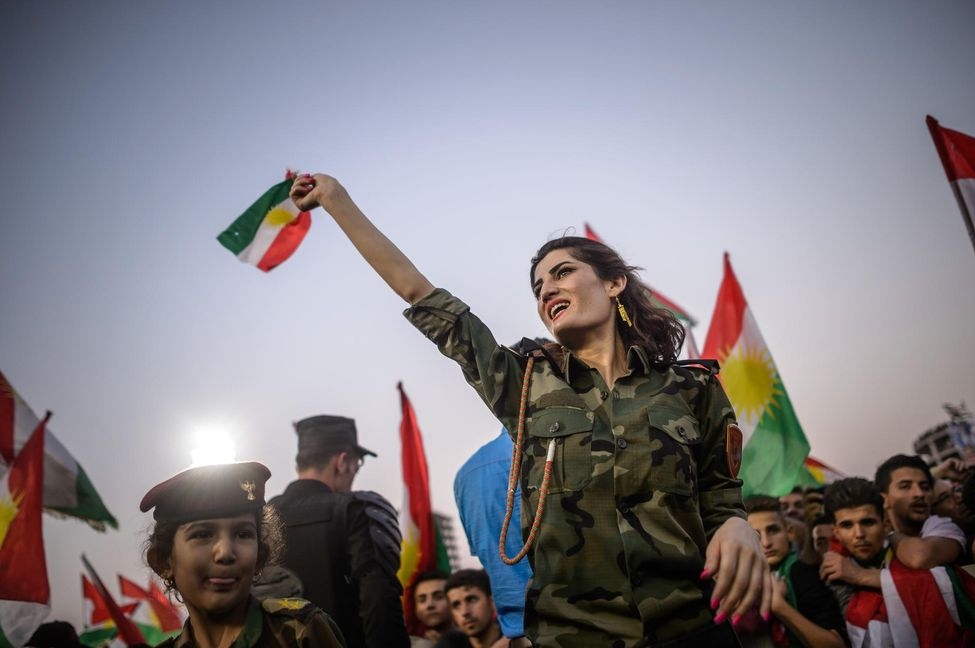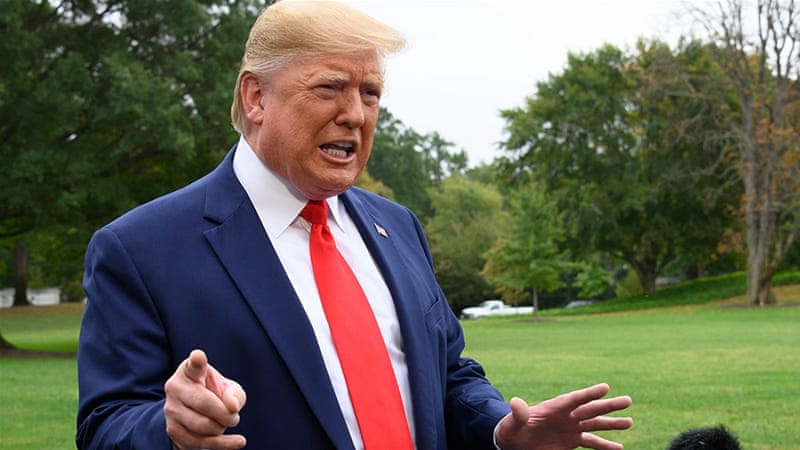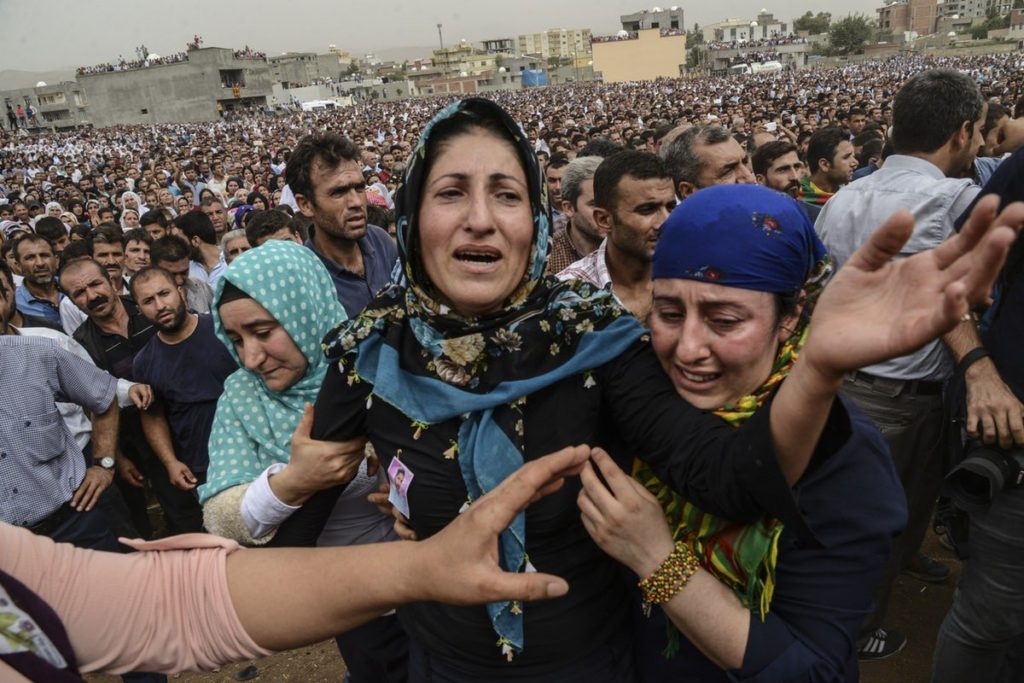
It is hard to comprehend the logic of Mr Trump’s decision to withdraw US forces from the Kurdish occupied areas of Syria. In one quick flourish of the pen, and a childishly daft bit of Tweeting (or whatever), he has potentially undone years of hard work and the sacrifice of thousands of lives, to bring ISIS, and that hornet’s nest called Syria, under control. Not only that, he has set Turkey on a collision-course with both NATO and Europe – as well as the States, and possibly made certain that President Erdogan will turn to Russia as a strategic ally. (Added to all the above is Erdogan’s latest threat to force millions of refuges and migrants into Europe once again.) Trump has, in effect, scored a most colossal own-goal, the potential consequences of which should not be underestimated.
The most reprehensible part of all of this is perhaps the way he has turned his back on the Kurds who have shouldered most of the ground-fighting on behalf of the Western Allies (who have been supporting them with weapons and, deniably of course, Special Forces training and expertise). Trump’s staggeringly crass explanation that the Kurds were not long term allies of the US has gone viral, with some asking if that press release was one of these new sophisticated hoax-videos. For the only alternative seems to be that the President of the US has genuinely now “lost the plot”.
From a security aspect, Trump has also set the scene for a possible release of thousands of hardened ISIS fighters who are being held by the Kurds. The prison guards are now being thinned out to defend against the Turkish attack and already there seem to be signs that ISIS is taking advantage of the chaos to regain some of their lost momentum. Added to that is the claim that Turkey might well have been supporting elements of ISIS all along in an attempt to weaken the Kurds in Syria as a precursor to a Turkish invasion of their territory.

Analysis of Trump’s comments about the Kurds is, typically, a story of semi-coherent sound bites, laced with repetitions and childishly basic sentiments. That said, he was initially prepared to be generous and confirm that the Kurds were doing a great job and that they were doing the fighting (and dying) to stop ISIS. He stated on several occasions that the US would never let the Kurds down: a hollow promise that seems to have parallels with his other decisions to pull the States out of the climate change agreement and the Iranian nuclear deal.
Then he made that most crass of all comments when he justified his actions by asking where the Kurds were in the Second World War. Apparently quoting some “very powerful article”, he said they did not help “us in the Second world war; they did not help us with Normandy”! If you listen to that press briefing you should listen carefully to his next words as they seem to indicate that he has a real problem with his brain-to-mouth connections.
After mentioning Normandy the President goes on to say:
“They (the article author) mentioned names of different battles they were the..but they’re there to help us with their land and that’s a different thing. And in addition to that we have spent tremendous amounts of money on helping the Kurds in terms of ammunition, in terms of weapons, in terms of money, in terms of pay.”
This is as exact a transcript as it is possible to make, given the sometimes less than properly-formed words being uttered by the President of the US. The transition from talking about the Kurds’ lack of action in France in 1944, to the puerile comment about the amount of money the US has given Kurdish fighters trying to defeat ISIS, is so incompetently handled that you are hard-pressed to believe it was not an editing glitch; it wasn’t.
It is, in effect, an incoherent ramble, a stream of not-so-conscious consciousness, increasingly typical of what is now coming out of the White-house. He then goes on to compare the Kurdish/ Turkish relationship with that of the Israelis and Palestinians, and wonders whether the level of hatred between Turkey and the Kurds is even greater.
These are not the words of a great leader. They are clearly intensely embarrassing to other NATO premiers and must be a source of concern to many in the US.

They also confirm in many people’s minds that America is no longer a trusted nation whose word is its bond. It also has direct parallels with the saga of the Marsh Arabs of Iraq who were implicitly encouraged to rise up against Sadam Hussein in 1991 after the US had indicated that they would support such a move at the end of the First Gulf War. As history relates, the US did not assist them, and many Arabs died as a consequence, including Kurds. One reason for the US’ reluctance to get involved at that time was again the issue of Turkey, which had already been fighting a protracted internal civil war with Turkish Kurds.
The other more recent example is that of President Obama’s failure to step up to the mark when Syria crossed his publically-declared “Red Lines” to do with the use of chemical weapons against the civilian population. Once again, many saw this as a betrayal of the people who were then attacked relentlessly by the Regime. Obama did at least have the excuse that the rest of the world had seemingly subsequently vetoed any support for intervention when the British government voted against getting involved.
However, Mr Trump’s appalling lack of judgement has been further compounded by his subsequent comments – many of which seem to be the usual knee-jerk reactions rather than any sort of considered response to what many would consider to be entirely predictable outcomes of his decision. He at first tried to assure the world that Turkey would not break the agreement - to do the dirty on him. Then, when Turkey proved very willing to do just that, Trump proceeded to wave a red rag at the Erdogan bull, threatening to destroy Turkey financially, a move guaranteed to make things better. Then, having said that the main reason for his withdrawal of the US forces was to extract the US from interminable wars and fighting, he threatened to send thousands of troops back into the Kurdish area. Finally, he seems to have taken a deep breath and has now offered to mediate – though how he can now present himself as both an honest and competent broker seems problematic to say the least.
The indignation of Western nations to the US withdrawal has been mirrored by that of the Israelis who believe that, by pulling out of Syria, Trump has opened up a possible direct land-link between Iran and Hezbollah in the Lebanon. Informed commentators in Israel have expressed incredulity that Trump, much lauded by the far-right in that country, could have shown such a poor grasp of Middle East affairs.
One of the few glimmers of light on the horizon is that Russia has also come out and expressed concern at the Turkish action and the possibility that the whole Syrian shooting-match might kick off all over again. They are also very sensitive to the prospect of having Islamic-fundamentalists at large, given that Russia has had its own serious problems with religiously-inspired terrorists. That said, if Turkey bows to Russian pressure to end the operation, then it will be clear evidence that Turkey has indeed moved out of the US and NATO sphere of influence and back to its regional super-power role in Asia Minor.
All in all, few will see this as anything but a deeply shameful act of betrayal. An act that will possibly damage relations between the West as a whole and many in the Middle East (and elsewhere) who will cease to regard the US and Europe as trustworthy partners in an increasingly problematic world.
Thank you, Mr Trump. Job well done.

Comments on He can-not be serious: Trump’s betrayal of the Kurds.